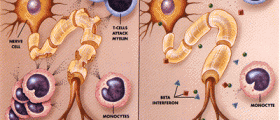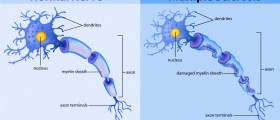
Introduction to Muscular Sclerosis
Muscular sclerosis, also known as multiple sclerosis, is a progressive neurological disease. It causes irreversible damage to the myelin, a substance which normally covers the nerves and is essential in transmission of the nerve impulses.
The loss of myelin (demyelination) is typical for muscular sclerosis and depending on which nerves are affected by the process of demyelination patients experience different symptoms. The disease typically leads to loss of muscle control and physical and mental disability.
Muscular sclerosis is considered an autoimmune illness. It is progressive and severe and requires life-long therapy. Permanent loss of myelin, especially if it affects many nerves or vital parts of the nervous system, can cause severe disability.
Apart from being classified as autoimmune disease, there is no actual cause related to the occurrence of multiple sclerosis. Scientists suspect that vitamin D deficiency may be associated with the onset of the disease. The disease may be also related to genetics but this has not been proven yet. And finally, some believe there is a connection between certain viral and bacterial infections and the onset of the disease.
What are Early Symptoms of Muscular Sclerosis?
Some people first develop coordination and balance difficulties. The problem may be short-lived or last longer and cause persistent unsteadiness. These difficulties may be in a form of swaying, stumbleness, dizziness, vertigo etc. Loss of balance and coordination may point to the ongoing process of demyelination in the cerebellum.
In some patients initial symptoms of muscular sclerosis include sensation disturbances. Certain parts of the body may become numb or the person suffers from tingling sensations. Furthermore, deviation in sensations may be in a form of burning and prickling sensations. These sensory disturbances are actually the most common in early stage of the disease. The abnormal sensations can affect a small part of the body or extend to larger areas. They may also last for a short period of time or linger and interfere in patient's every day activities.
The beginning of muscular sclerosis can be also accompanied by visual disturbances. Patients complain about double vision, blurred vision, color distortions or loss of vision. Fortunately, visual problems are reversible.
And finally, patients suffering from muscular sclerosis may initially complain about weakness and loss of muscle strength. Weakness most frequently affects arms and legs. This problem may additionally affect coordination and balance.
All of the previously mentioned symptoms must be taken seriously and reported as soon as possible to a doctor, who can perform examination and tests to either confirm or rule out muscular sclerosis.
















-and-Multiple-Sclerosis-Differences-And-Similarities_f_280x120.jpg)
Your thoughts on this
Loading...